
Susan Montgomery retires from the department
Her colleagues and former students talk about the impact she has had on the department and thank her for her support and dedication to students and education.

Her colleagues and former students talk about the impact she has had on the department and thank her for her support and dedication to students and education.
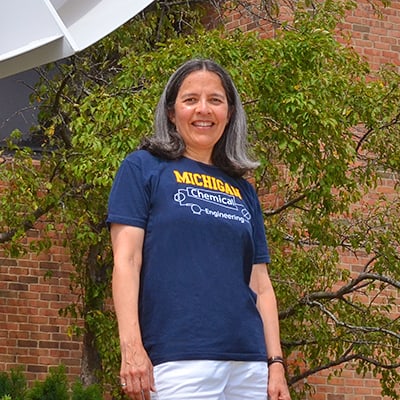
An observation by a former student may best sum up the respect students and colleagues have for Susan Montgomery as a teacher and mentor. “I believe the undergraduate experience would be elevated even higher if every engineering department had a ‘Susan Montgomery’! ” — Leroy Covington (BSE ’03)
After 27 years as a faculty member in Chemical Engineering—including 23 years dedicated to advising and teaching our undergraduate students and running the undergraduate program, Dr. Susan Montgomery retired from the department on May 29, 2020. In that time, she has redefined how a faculty advisor can better serve students’ needs.
As Sharon Glotzer, Anthony C. Lembke Department Chair of Chemical Engineering, mentioned in a message to the department and alumni in May, “Beyond advising students scholastically, Susan—or Dr. M, as she is affectionately known—has been a mentor in the truest sense of the word,” Sharon says. “She anticipated student needs, and marshaled resources to meet those needs. She cheered our students on and helped build our students’ confidence as well as their knowledge of chemical engineering. Even more, Susan helped our students build a sense of self—a key foundation to living one’s best life.”
Ron Larson, George Granger Brown Professor, A.H. White Distinguished University Professor and a former department chair adds, “She extended this care to graduate students as well, and was also very active within the College of Engineering, providing the “gold standard” for dedication to students and their interests and well-being.”
Born in Peru, Susan moved with her family to Nicaragua when she was 10. In 1978, in the midst of their civil war, Susan, her mother and sister went to live with her American grandmother in Ann Arbor, where she studied at Pioneer High School. While at Michigan, Susan continued to live with her grandmother, who was a great source of support and encouragement
Susan’s time in our department started in the fall of 1982, when she took ChE 230, now Material and Energy Balances, with Professor Johannes Schwank with Bob Ziff as her recitation instructor.
Sandy Swisher, who started in the ChE UG office around that time, and became one of Susan’s best friends over the years, recalls that, “The department had just moved from East Engineering to the new H.H. Dow Building in August 1982. There was much confusion during those first few days of classes in Dow with students scurrying around trying to find their classrooms.”
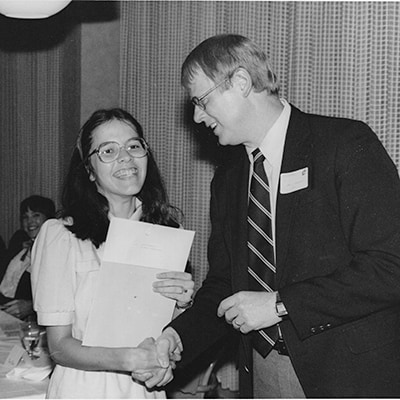
Karen (Cooke) High (BSE ’85), Professor of Engineering and Science Education at Clemson University, remembers those early days in the new Dow Building: “North Campus was very different then and as we traveled to North Campus, we felt like we were traveling to Alaska. The big classrooms on the ground floor were very intimidating. Susan was a rockstar ChE student yet I remember her being very kind and modest and a great colleague.”
Susan was involved in the American Institute of Chemical Engineers (AIChE) student chapter and Engineering Council, the predecessor of Engineering Student Government, and was on the committee that organized the first College of Engineering graduation ceremony, which took place in 1983, in collaboration with Elaine Harden, under Dean James Duderstadt’s leadership. In recognition of her leadership in the department and College, Susan received the Arlen R. Hellwarth Award as a senior.
Jim Duderstadt, now president emeritus of U-M and University Professor of Science and Engineering, encouraged her to get her PhD and come back to Michigan. “ I have followed Susan’s amazing career at Michigan for over 30 years,” he notes, “and continue to admire her deep understanding of learning and her skill as a scholar, a teacher, and a source of help and inspiration to our students. Fortunately we will continue to have her assistance and wisdom for several more years before she actually retires!”
Another of her classmates, Bob Pociask (BSE ’84) recalls his first encounter with Susan in Dow Building. “She and her colleagues befriended me, the oddball older student who spent way too much time in lounges studying,” he recalls. “Her kindness and intelligence were always evident.”
Bob would reunite with Susan years later when he brought his wife on a Sunday afternoon to see the Dow Building. “As we reached the front door, someone opened the door for us and asked if she could help us. It was Susan! She kindly took us on a quick tour, and found Dr. Fogler so I could say hello. That’s Susan.”
When Scott Fogler, Arthur F. Thurnau Professor, Vennema Professor and former department chair, learned that Susan was unable to find scholarship assistance to take ChE 343, Separations, the summer of 1984, he offered her a position working in his lab and typing the first edition of his reaction engineering textbook. This began a working relationship with Scott that continues to this day.
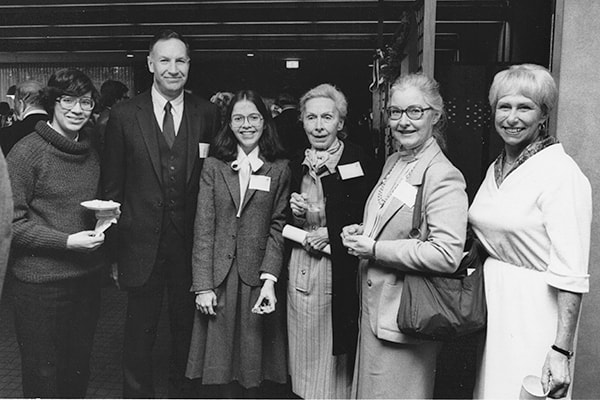
“Jim Duderstadt had lent me the College of Engineering’s first word processor that summer and Susan was one of the students who used it to type the first edition of my textbook,” Fogler remembers. “She was only 17 or so at the time but she had been one of the top students in my reactions class. I remember that she was able to help me refine and rework the draft manuscript in real time.”
Bruce Vaughen (BSE ’84) also remembers Susan as someone who was willing to help any student. “I can’t help but reflect that without having her support during many of my Michigan days, I most likely wouldn’t have made it to graduation,” he says. “I am sure that many of the other 2,500+ students she advised and mentored over these years feel the same way—we all have a place in our hearts that she touched and special memories of her kindness.”
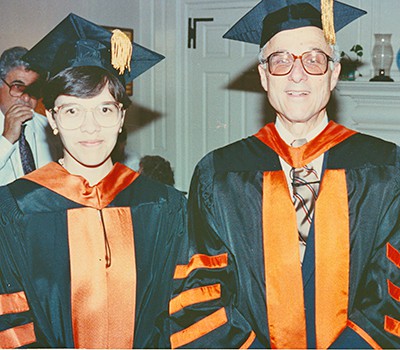
Classmate Sean Montgomery also worked in that lab and created some cartoons for the textbook. During a trip to Cedar Point with classmates Michelle Stephens and Linda Stephens that summer Susan and Sean fell in love. After graduating from our undergraduate program in December 1984, they married in July 1985. They went to Princeton for graduate school, where she worked with Professor Luddy Rebenfeld at the Textile Research Institute on flow through porous media. While at Princeton, she had the chance to teach a pre-algebra class at a community college and be a teaching assistant and later the core instructor for the ChE junior lab, experiences which confirmed her desire to become a faculty member.
She returned to the department in 1991 to work for two years as a postdoctoral fellow with Scott Fogler, supervising a dozen undergraduate students, following on the work of a fellow postdoctoral fellow, Robert Zipp in the development of educational computer modules based on interactive problems Scott had developed over the years. These modules were delivered to every Chemical Engineering department in the country through the CACHE Corporation.
Thanks to Scott Fogler’s vision, the College of Engineering decided to hire a tenured faculty member who would specialize in engineering education research (EER). With his encouragement, Susan applied and then got the position in Chemical Engineering, starting fall 1993. They were definitely ahead of their time, though, as the College wouldn’t hire the next tenure-track EER faculty member until 2016.
Susan began to research the use of computer-based educational materials to address different learning styles in Chemical Engineering. Her first NSF grant included funding for the development of a Visual Encyclopedia of Chemical Engineering Equipment, fulfilling a promise she had made to herself as an undergraduate. Back then, she wished there had been a book that explained what chemical engineering equipment looked like and how it worked, and vowed to write one herself. She was fortunate to be able to lead the Encyclopedia project for the next 25 years.
Sam Catalano (BSE ’98), now Operations Turnaround Coordinator at Marathon Petroleum, was one of the students on that project. “I came on to the project a couple years into its life as a developer. We were still trying to figure out what equipment to include, what standards to set, and how to work with the animation software. Susan had a vision for a one-stop shop for young chemical engineers who were still in school or just starting out to find out more about the equipment and processes that they would soon be working with.”
Susan always insisted on honesty, integrity and doing things the right way. Many times, it drove me a little crazy as it often resulted in a lot more work. Every time though, she was right, and that has stuck with me over the years.
Mike Africa
The Encyclopedia provides general information about how over 100 types of ChE equipment work. More recently they have developed application modules that place these pieces of equipment in the context of Chemical Engineering processes, such as the production of pharmaceuticals, and process safety.
Mike Africa (BSE ’94), Senior Desktop Support Specialist in the department, was one of the first students to work on the encyclopedia, “Susan always insisted on honesty, integrity and doing things the right way. Many times, it drove me a little crazy as it often resulted in a lot more work. Every time though, she was right, and that has stuck with me over the years. What will I remember most about Susan was her belief in me and the other students.”
In 1997, upon the retirement of Dale Briggs, who was Susan’s advisor, Susan left the tenure track for the lecturer track and assumed the advisor role, allowing her to focus more on teaching and student support. As undergraduate advisor, Susan met with students to update course plans, review graduation audits and discuss academic success strategies. Those who are struggling academically or want to “up their game” would meet with her biweekly. Many students also popped in during the year if they had had emergencies, needed recommendation letters, or wanted to discuss summer or post-graduation plans, get their resumes reviewed, or brainstorm student organization issues. She was always available, particularly during her Friday walk-in hours, held in the Duderstadt Center atrium.
Students certainly appreciated the role she played in their time at Michigan:
Steve Waier (BSE ’88), a recruiter for Dow Corning, found out that “she met individually with students and helped them plan their undergraduate careers. Students who struggled early on said that she personally encouraged them to work hard and not quit the program.”
Kami Kharazi (BSE ’18) says, “Her office was always a place of warmth. She treated you like you were her own kid. I appreciate that she fostered an environment where student input was a huge point of emphasis and cared enough to let us play a part in making decisions for the department’s future.”
Susan befriended students and offered them support beyond the academics. Jackie Priestley-Dunn (BSE ‘14) recalls, “I was a non-traditional student, waiting 10 years after high school to attend Michigan and when I did I was a parent and worked full time to pay for school. Dr. M. helped me apply for scholarships, gave me advice with parenting issues, and even relationship issues.”
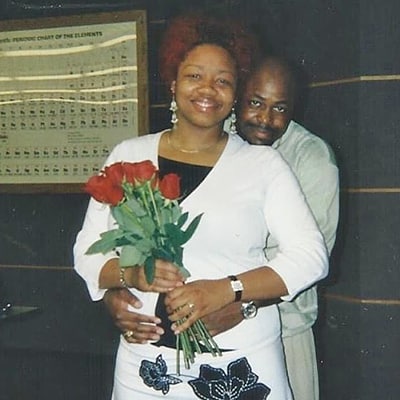
Leroy Covington (BSE ’03) notes that in the summer of 2006 he was preparing to propose to his girlfriend and thought it would be romantic and memorable to propose in the same location in which they first met – the Chem 130 room in 1640 Chemistry Building. “As luck would have it, spring semester was in session and the CHEM Building was not open for extended hours. Susan went out of her way and arranged for me to pick up the keys to the CHEM Building and stage the proposal. The proposal was a success…she said yes!” This past April 28, Leroy and his wife, Janicca Buggs Covington (AB Psychology ‘01), celebrated 13 years of marriage.
Through the years, Susan’s emails to the students became legendary. She would send emails about new policies, programs, and courses, job and internship postings, the career fair, as well as encouragement aimed at those with mental health and other issues, with pointers to resources and a reassuring word.
“When I hear the name Dr. M, I think about the many, many emails she would send,” adds Jackie Priestley-Dunn. “In her first email she would tell us that she is going to be sending emails, and then, the storm hits! But the number of emails she sent doesn’t even compare to how much she cared about each and every student.”
Meredith Citkowski (BSE ’13, MBA expected Dec ’20), Business Program Manager at Ford, recalls “I have never met someone who simultaneously nurtured with the compassion of a wise parent, advised and taught with the knowledge of a credentialed and established scholar, and connected with the warmth of an old friend. Tomorrow’s students will never quite know or feel the quiet force of “Dr. M” permeating North Campus (and their inboxes!) but I am so, so grateful that I have.”
She also supported and advised a number of PhD students in the department, including Richard Ezike (PhD ‘11), now a Transportation Equity Expert and STEM Advocate. “She was very supportive after I left my first advisor. She provided comforting advice, letting me know that I was capable of finishing my PhD and had all the necessary skills, and helped me find a new advisor to finish my degree.”
Her support went beyond students. Ralph Yang, John B. Fenn Distinguished University Professor of Engineering and Dwight F. Benton Professor of Chemical Engineering, says, “Susan is always eager to help the students. She is equally willing to help her faculty and staff colleagues whenever asked.”
Dow Corning Assistant Professor Bryan Goldsmith, who joined the department in 2017 says, “Susan served as one of my greatest teaching mentors during my first year at Michigan. My main lessons from Susan were not technical, but rather how to teach and advise students with passion and humanity. I consider myself lucky to have been mentored by her!
Staff member Catrina Hamilton, who works in the undergraduate office, notes, “In 2018, she welcomed me into the office with enthusiasm, patiently supporting me in my new role as administrative assistant. She inspires me to stay passionate about the work and commitments of the program.” Her colleague in the UG office, Barbara Mintz, adds, “She was extremely thoughtful and collaborative, always open to new ideas, but helped me to think through all the details and ramifications of executing those ideas.”
In addition to advising, Susan slowly gained responsibility for the undergraduate program, becoming Director of Undergraduate Studies. Mark Burns, T.C. Chang Professor of Engineering, recalls that, “The undergraduate program is very large and complex, and there is no way a single individual could understand the entire enterprise and keep up to date on all that is transpiring at any given point in time. Except Susan! She knew who was teaching what course and the strengths and weaknesses of those courses. She also knew how the students were responding to the courses and whether there were individuals in need of specialized instruction or attention. The result was that, on each day when I had a hundred different things to do, worrying about the quality of education for our students was not one of them because I knew Susan was directing the program!”
The undergraduate program is very large and complex, and there is no way a single individual could understand the entire enterprise and keep up to date on all that is transpiring at any given point in time. Except Susan!
Mark Burns, T.C. Chang Professor of Engineering
Susan made sure that the ChE UG Program Committee (UGPC) included junior and senior student representatives, so that students would have a voice in the growth of our program. Updates to the program during her tenure include the creation of many minors and concentrations to allow students to focus their electives in specific areas, SUGS programs for students who wished to tack on a masters program.
Another program that has had great impact on many students is the development of Sunday review sessions for all sophomore and junior core courses, expanding on the work of Maurice Telesford (BSE ’06). Maurice, now a science teacher at Redford High School, recalls, “I asked her if I could teach a supplemental instruction section for ChE 230, particularly underrepresented minority students. I’m incredibly appreciative that she gave me the chance because it helped affirm my decision to pursue my career in education.” The expanded program not only provided additional resources for students, it also gave teaching opportunities for undergraduates who were determining whether to go on to academic careers.
When Mark Burns was chair, Susan established a textbook program for undergraduates.“The concept was simple enough—provide textbooks for students that couldn’t afford to buy them,” he recalls. “I liked it because it helped decrease the impact of economic disparities. The students liked it because they didn’t have to choose between money for food and money for a textbook. Many of our alumni liked the program so much that they contributed funds to offset the cost! The whole experience was wonderful.” The program continues in the department, providing approximately $15,000 a year in free textbooks for ChE core courses for students facing financial hardships.
Susan also instituted the UG-office run peer evaluation program, which Laura Hirshfield (BSE ’09, PhD ChE Purdue ’13), now Diversity, Equity, and Inclusion Lecturer in the College, assisted her with in recent years. This extensive peer evaluation process was based on an evaluation form initiated by Barry Barkel (BSE 1965), who after 30+ years at BASF joined us to update the senior design course, among others. It allowed instructors to become aware of team issues early enough in the process to allow them or Susan to intervene and educate and mentor students on expected team performance, and to offer assistance as needed with external issues that were causing the issue. Many alumni will recall completing these forms, and she hopes that they got useful feedback that allowed them to grow as professionals and leaders.
Fall 2005, at Scott Fogler’s suggestion, Susan initiated the annual ChE Senior Dinner, the night before commencement. AIChE sophomore representatives organize the dinners, with support from Catrina Hamilton in the UG Office. “Susan’s interest in each individual student would show through, as she would tell an interesting anecdote or remark about each graduating student, often close to 100 of them,” says Ron Larson. This year’s Zoom event on May 1, 2020 was particularly memorable. It attracted 58 students and their families, with over 150 logins, including many faculty and staff. Students appreciated the opportunity to be together one last time, as each was individually recognized and applauded by their classmates. Students also enjoyed a congratulations video from the faculty compiled by new advisor Brittiany Smith and Heather Guenther in our communications area.
Johannes Schwank, James and Judith Street Professor of Chemical Engineering, adds, “Susan is one of the rare individuals who takes the time to get to know students on a personal level, beyond just the academic issues. Our department will feel the impact of Susan’s work as program advisor for many years to come as it results in remarkable alumni loyalty.”
Susan organized alumni mentoring sessions, with many alumni coming to campus over the years to meet individually with students and provide them guidance, including our Alumni Advisory Board during their yearly meetings. Susan also created a career counseling spreadsheet that points students to over 300 alumni who have volunteered to serve as mentors to our students, which they greatly appreciate.
A few years ago, Susan created a LinkedIn alumni group page for our graduates to share job listings, and alumni and department information, which now has over 2,000 members. She also invited alumni to share photographs from their travels with “Flat Charlie,” the department mascot. https://www.flickr.com/photos/55746678@N02/
Since 2005, Susan has invited alumni to come to ChE 230 to talk about their professions and to ChE 342 and ChE 343, Mass and Heat Transfer and Separations, to present more technical talks on real-world industrial applications of fundamentals, and MCd the sessions, hosting a lunch between the sessions to allow alumni to catch up with each other and with departmental faculty and staff.
Bryan Goldsmith, who has taught ChE 230 for the last three years says, “Overall, these panels were both fantastic experiences for the class and highlights of the semester. Susan even served as photographer for these events and for other events including ChE 230 poster sessions and other outreach activities!” Susan also invited two alumni who are chemical engineering professionals to discuss the Process for Ethical Decision making and the AIChE Code of Ethics, as well as relevant case studies. She created an ethics assignment for the ChE 230 students to reflect on the discussion and the process for ethical decision making.” She also presented these workshops in the Civil Engineering introductory course for many years, using quotes from an interview she conducted with her Civil Engineer father, whose life motto is “la etica es mi vida,” “ethics is my life,” expressly aimed at beginning Civil Engineering students.
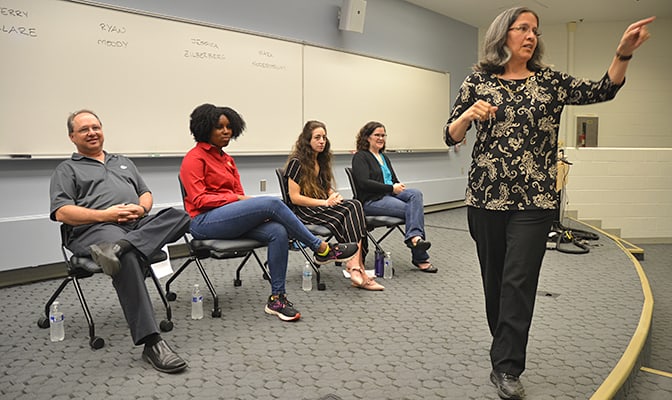
Sharon Pfeuffer, of DTE Energy, recalls, “Susan worked well with the alumni, asking for our input and feedback on what we needed for our student interns and hires to be successful in our various fields. Each spring she would reach out to those of us who had worked with the students in their internships, looking for the stories of their successes that she wove into their graduation events, further encouraging them.”
As a Dow ChE recruiter I worked with her for over 25 years,” says Bob Ranger (BSE ’83), “she always encouraged all the students to get resumes ready for the Career Fair. Over the years, her efforts emphasizing Career Fair helped roughly 100 students get full time jobs at Dow and many others get co-op or summer intern jobs. Dow’s UM ChE recruiting team today are all students she worked with.”
Alumni were also instrumental in the creation of ChE 485, Chemical Process Economics, recommended by the Alumni Advisory Board, and created and taught originally by Mike Solomon. Susan taught the class many time and created a “script” so others could easily teach it every semester.
Susan has always been grateful for the loyalty our alumni show to the program, as it has enriched our students’ lives and that support has been invaluable in their success.
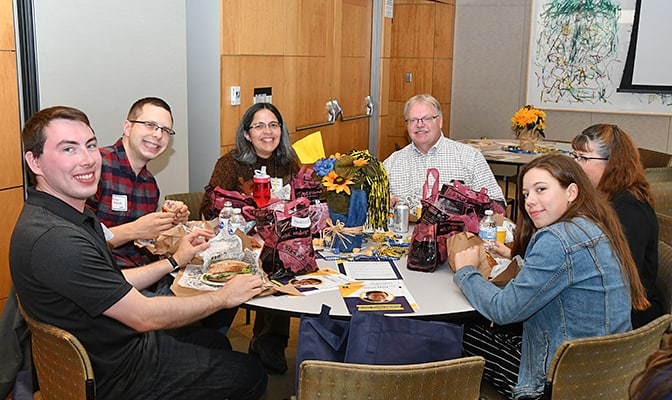
Susan was inspired by a talk at an AIChE meeting in the early 1990s by Professor Phil Wankat, now emeritus professor at Purdue, to offer Teaching Engineering (ENG/ChE 580). Wankat shares that “Susan volunteered to critique the draft of the second edition of my book, Teaching Engineering, and her over 600 comments greatly improved the text.”
Susan taught the course 21 times, serving over 500 graduate students considering academic positions and helping them prepare for their teaching responsibilities, “To the best of my knowledge Susan has taught Teaching Engineering more often and served more graduate students than anyone in the United States,” Wankat says.
One of her former students in the class, Leigh McCue (PhD Naval Arch ’04), now an Associate Professor at George Mason University, says, “I was a student in her ChE/ENGR 580 class in winter of 2004. It was such a valuable class that I still have a binder of notes sitting on my bookshelf. The skills she imparted in her students, specifically developing the capability to adapt teaching style based on learner needs, has been particularly valuable in the unique educational environment of the COVID-19 era.”
Cindy Finelli, Director, Engineering Education Research, co-taught this course with Susan two times and was a guest lecturer in the class many times.Cindy says, “The level of her engagement with her students always impressed me. Whether the discussion focused on writing teaching philosophy statements, preparing for an academic career, or introducing ethics into the engineering curriculum, students in her class could be counted on to participate in a lively conversation. Her own enthusiasm about the material was clearly contagious, and her dedication to teaching was clear.”
Susan is pleased that Laura Hirshfield and Cindy Finelli will continue to offer the class, alternating years.
Susan also taught half of the chemical engineering core courses during her time at Michigan, from Material and Energy Balances through Process Design. “I am fortunate to have had the opportunity to get to work with such dedicated students,” she says. “Their enthusiasm pushes us as faculty to do an outstanding job when we see how hard they are working.”
Susan also taught first-year students in Engineering 100, Introduction to Engineering. She co-taught a product development-focused section with Technical Communications instructor Rod Johnson, where the students reverse-engineered existing devices such as toasters, NERF guns, and RC cars, and proposed suggestions for improvement, for 10 years.
Rod says, “I can say without hesitation that my partnership with her has been the most rewarding of my professional life. Engineering 100 was a notoriously difficult course to teach, with several disparate objectives all competing for class time (engineering design, communication, ethics, teams, and others). Susan was a natural fit, understanding the need to be a coach and mentor to the students as well as providing content instruction. She had a gift for getting students to buy into the course and getting them involved and active, which is not always easy in a 100-person lecture.”
Some of Susan’s innovative teaching methods are featured in videos from the Center for Research on Learning and Teaching (CRLT). Matt Kaplan, Executive Director of CRLT, says, “Susan was one of our early faculty associates, and she has written papers for us and conducted a number of workshops. She also volunteered to host faculty colleagues to observe her teaching, so we could make videos that we have used for years as an outstanding example of active learning in a large class.”
In 2012, the University recognized Susan’s excellence in teaching when she was named one of the University’s five inaugural Collegiate Lecturers. She was honored for her work as a “dedicated teacher and advisor who routinely implemented new and novel teaching strategies in her courses.” In naming the lectureship, Susan honored G. Brymer Williams, who had a long career in the department and served as undergraduate program advisor before Dale Briggs. Brymer was a very popular professor, dedicated to students and he continued to keep in touch with many of them long after they graduated. “The best thing about honoring Brymer,” Susan says, “has been hearing from alumni over the years who remember him as one of their favorite professors.”
In addition to serving the department, Susan was a valued contributor at the college and university level. She served on the College of Engineering Curriculum Committee for over 20 years, including serving as chair recently, and has become a historical resource for curriculum changes for the College.
Jennifer Linderman, Pamela Raymond Collegiate Professor of Engineering and Director of the ADVANCE Program, says of her longtime colleague, “I have worked with Susan for many years, on committees such as the Undergraduate Program Committee, on matters of student advising and courses, and so on. When Susan’s take on something is different than mine, I know that I need to listen carefully—most often she has thought more deeply about the issue, or has more experience with it, or brings the perspectives of different groups of students to the forefront. What a valuable colleague, and friend!”
Susan has been a great supporter of students with mental health issues. Angie Farrehi, Director, Michigan Engineering C.A.R.E. Center, shares, “Susan has always been an advocate for all of her students. She’s keenly attuned to their environments and needs. She is very comfortable talking openly with students about challenges that she has experienced and wants to see her students succeed and get them connected to appropriate support. She has referred students through the years to our office and we work together to support students in need.”
Pete Wangwongwiroj (BSE ’13) recalls, “I knew I could go to her about mental health struggles, moral dilemmas, and just life in general. Even after graduation, I know she’s still there if I need her, more so than any other advisor I’ve ever had.” She also advocated at the university level for better access to resources for students.
Susan is proud of her work in supporting student organizations and helping to establish new organizations. “It’s great to work with students who bring in the energy and enthusiasm to create new opportunities for their fellow students,” she says.
Within Chemical Engineering, Susan served as a resource to the AIChE student chapter, and in 1996 helped found the Beta Theta chapter of Omega Chi Epsilon, the national honor society for chemical engineering. She also supported students in the creation of the Food Industry Student Association (FISA), established in 2014, and Michigan Process Equipment & Demonstration (MPEDD), a multidisciplinary engineering organization started in 2015.
Susan founded the student chapter of ASEE (American Society for Engineering Education) in 1994 as the second ASEE student group in the country, and served as their faculty advisor until 2020. ASEE officers have created community among graduate students interested in teaching, and they developed many programs to help other graduate students prepare for academic careers, including bringing in many speakers, and organizing opportunities for graduate students to present talks, and to teach mini software and other courses on campus.
Her dedication to ASEE stems from the supportive community she found there, starting as a graduate student attending the 1990 Conference in Toronto. Through ASEE she met Rich Felder, fellow Princeton alum and author of the widely used textbook, Elementary Principles of Chemical Processes, who has been a mentor and friend. Rich says about Susan, “Most university departments have a legendary teacher-advisor somewhere in their history. They are the teachers the students go to for help with their academic and personal problems and always get the help they need. Those students remember those teachers fondly for the rest of their lives, and for years after graduation the teachers get Christmas cards, wedding invitations, birth announcements, and annual family newsletters from their former and forever students. Susan Montgomery belongs to that elite corps of saintly educators.”
Since 1994 Susan has also served as faculty advisor for the Society of Hispanic Professional Engineers (SHPE), an organization that is particularly close to her heart, as it has allowed her to mentor underrepresented minority students and stay connected to her Peruvian roots.
Elio Morillo (BSE ME ’15, MSE Systems Engineering and Design ’17), says, “Dr. M. was especially mindful about students needing extra resources to attend regional and national conferences, where many members achieved internship or full-time offers. She was also keen about giving students letters of recommendations for scholarships and/or graduate school applications. Her warmth and candidness exemplified the leadership development we always sought for our members and solidified our sense of familia.”
Electrical Engineering student Nancy Hernandez, SHPE President 2019-20, who had a similar working and personal experience with Susan says, “She helped me as president create goals for the year that would improve the professional and academic development of the chapter’s members. She also advised me on how to improve and helped me make a plan on how to approach each of my classes. That advice has helped me to this day.”
As an award-winning, long-time lecturer and program advisor, she has challenged and empowered all Chemical Engineering students to excel.
Alec Gallimore, Robert J. Vlasic Dean of Engineering
Susan is confident that she has left the undergraduate program in good hands. After a two-year transition process, Professor Fei Wen, the Associate Chair for Undergraduate Education, and Brittiany Smith, our new Undergraduate Advisor, have taken on the core of Susan’s responsibilities. Barbara Mintz and Catrina Hamilton are continuing in their roles as Student Administrative Assistants in the UG office. “I leave confident that our students will continue to be well taken care of for years to come,” Susan says.
Thanks to the support of Alec Gallimore, Robert J. Vlasic Dean of Engineering, Susan has transitioned in “phased retirement” to a staff position as an academic coach with the College of Engineering, working one-on-one with engineering students in the Scholastic Standing system, first generation students, transfer students, and underrepresented minorities. She started this work her last year in ChE and, while she is going to miss the ChE department, she looks forward to continuing to work one on one with students, fulfilling her life mission to “be happy and bring happiness to others by helping them achieve their goals.”
She also appreciates the additional time to spend with her son, Ian, and daughter, Nicky, as well as long-time partner, Jon, and his son, Kyle. She also looks forward to returning as a volunteer at an afterschool program through the local Community Action Network, following her mother’s example of service to others, and to getting back to photography, which she blogs about at https://susanmontgomeryphotos.com/.
Dean Alec Gallimore is appreciative that Susan has chosen to stay in the college as she transitions to retirement. “Susan and I joined the Michigan Engineering faculty within a year of one another in the early ’90s. Over a nearly three-decade span, I know of few people in the College who have made a greater impact on more students. Susan made the selfless choice to commit her career fully to helping students to reach their potential. A product of the Ann Arbor Public Schools, a participant in CEDO-precursor programming and a Michigan Engineering alumna, she has brought personal context to her interactions with students, especially those arriving on campus with fewer privileges.
As an award-winning, long-time lecturer and program advisor, she has challenged and empowered all Chemical Engineering students to excel. Her imprint is evidenced by their success and gratitude as alumni. Congratulations, Susan, and thank you for your impactful legacy in ChE. We are grateful you will continue sharing your wisdom, as you better the lives of our students and the culture of the College.”